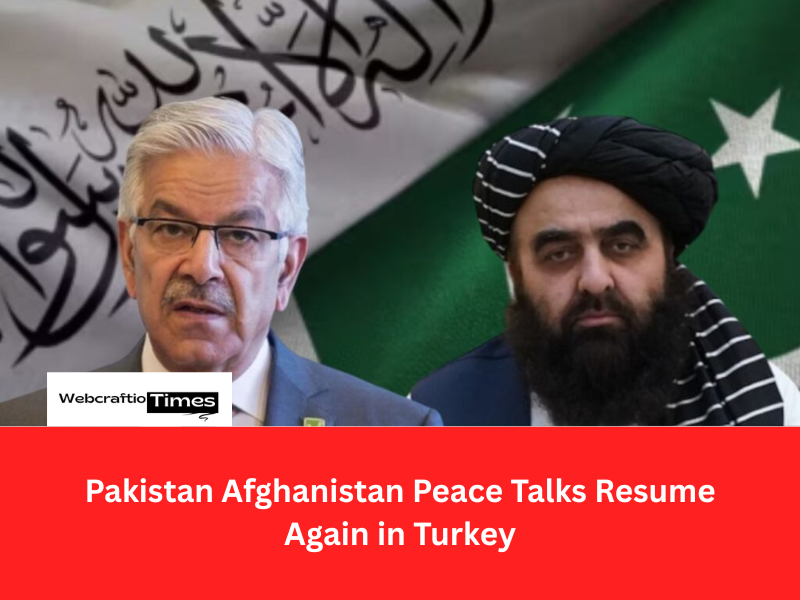The Pakistan-Afghanistan peace talks have resumed in Türkiye after weeks of border tensions and military exchanges. Both countries have agreed to extend their ceasefire and continue diplomatic engagement. The move is being seen as a cautious step toward stability in a region plagued by mistrust and recurring violence. Türkiye and Qatar are mediating the discussions to rebuild confidence between Islamabad and Kabul.
Background of the Pakistan-Afghanistan peace talks
The Pakistan-Afghanistan peace talks began after a sharp escalation along the Durand Line. Clashes between border security forces disrupted trade routes and displaced families on both sides. Pakistan accused militants from the Tehrik-e-Taliban Pakistan (TTP) of crossing into its territory from Afghanistan. Kabul denied harboring the group and urged Pakistan to manage the border through dialogue, not force.
The talks in Türkiye are part of an effort to prevent another round of bloodshed. Both governments realized that continued hostilities would damage trade, weaken border control, and strain humanitarian conditions. Türkiye’s role as a neutral venue created a rare opportunity for both sides to talk without external pressure.
Read This: Why Pakistan Afghanistan Peace Talks Failed in Istanbul?
Key outcomes from the Istanbul meeting
The latest session of the Pakistan-Afghanistan peace talks produced some progress. Both sides agreed to extend the ceasefire for another week. They also accepted a Turkish proposal for a monitoring mechanism. This system will track violations and promote transparency. Officials from both sides will share information directly instead of relying on third-party reports.
Another important outcome was the plan to hold the next round of talks on November 6 in Istanbul. Delegates will discuss technical arrangements, trade corridor security, and border patrol coordination. Türkiye’s Foreign Ministry released a joint statement expressing optimism that dialogue could lead to lasting peace if both sides stay committed.
Challenges still facing the peace process
Despite the progress, the Pakistan-Afghanistan peace talks face significant obstacles. Pakistan wants concrete action against groups attacking from Afghan soil. It believes these militants are responsible for several deadly incidents inside Pakistan. Afghanistan, on the other hand, insists that it does not support such groups and blames instability on Pakistan’s internal security problems.
This difference has kept both governments locked in a cycle of accusation and denial. Building trust will take time and practical measures. Experts say that border management, refugee control, and intelligence sharing are the keys to long-term success. Without addressing these issues, the ceasefire could collapse again.
Türkiye’s growing diplomatic influence
Türkiye’s involvement in the Pakistan-Afghanistan peace talks highlights its rising influence in regional diplomacy. Ankara has maintained relations with both Islamabad and Kabul. It also has a history of hosting negotiations involving Afghan factions. By acting as a mediator, Türkiye gains credibility as a stabilizing force in South and Central Asia.
Qatar’s participation further strengthens the process. Doha has previously hosted Afghan political talks, including earlier dialogues with the Taliban. Together, Türkiye and Qatar are trying to balance relations between Muslim-majority states that share cultural ties but face political tensions.
Regional impact of the ongoing talks
The outcome of the Pakistan-Afghanistan peace talks will shape regional dynamics. A lasting truce could reopen trade routes that are vital for both countries. The Torkham and Chaman crossings are critical for commerce and humanitarian supplies. Frequent border closures have disrupted local economies and hurt families relying on cross-border trade.
Improved relations could also support regional connectivity projects. Initiatives like the China-Pakistan Economic Corridor (CPEC) and Central Asia trade links depend on a peaceful environment. Stability on the Pakistan–Afghanistan border benefits not only the two nations but also neighboring Iran, China, and the Central Asian republics.
Economic and humanitarian dimensions
The conflict between Pakistan and Afghanistan has deep economic roots. Both nations depend on cross-border trade and transit revenue. Prolonged border tensions increase costs, discourage investors, and isolate communities. The Pakistan-Afghanistan peace talks aim to address these concerns by restoring regular trade flows.
Humanitarian agencies have also urged both governments to protect civilians. Many families along the border suffer from food shortages, lack of health services, and displacement. The ceasefire gives them temporary relief. However, only a stable political agreement can ensure lasting peace for these border communities.
Public reaction and media coverage
Public response to the Pakistan-Afghanistan peace talks has been cautious but hopeful. In Pakistan, many citizens want the government to prevent further violence while protecting national security. In Afghanistan, the Taliban-led administration faces internal pressure to show that diplomacy can safeguard sovereignty.
Media coverage in both countries highlights a mix of optimism and skepticism. Analysts note that several past peace efforts have failed due to poor coordination. Still, the presence of Türkiye and Qatar adds credibility and helps maintain communication channels.
The road ahead for Pakistan and Afghanistan
The coming weeks will be crucial for the Pakistan-Afghanistan peace talks. The Istanbul follow-up meeting on November 6 will test both sides’ willingness to move beyond temporary truces. If progress continues, the talks could lead to a framework for joint border management and counterterrorism cooperation.
For now, the extension of the ceasefire provides breathing space. It allows diplomats to work on confidence-building measures. However, sustainable peace requires more than military restraint. It demands political commitment, economic cooperation, and regional trust.
The region’s future stability depends on how Pakistan and Afghanistan handle these next steps. If the Pakistan-Afghanistan peace talks succeed, they could mark a turning point in South Asian diplomacy. If they fail, the cycle of mistrust and conflict could return, with severe consequences for both nations and their people.
FAQs
1. What are the Pakistan Afghanistan peace talks?
The Pakistan-Afghanistan peace talks are diplomatic negotiations aimed at reducing border tensions, extending ceasefires, and improving bilateral cooperation between the two countries.
2. Why are the Pakistan-Afghanistan peace talks happening in Türkiye?
Türkiye serves as a neutral venue trusted by both nations. It provides a balanced environment for dialogue and is supported by Qatar in facilitating discussions.
3. What was achieved in the latest Pakistan-Afghanistan peace talks?
Both sides agreed to extend their ceasefire, create a monitoring mechanism for violations, and hold the next meeting on November 6 in Istanbul.
4. What are the main issues between Pakistan and Afghanistan?
Key issues include cross-border militant activity, trade disruptions, refugee management, and disputes over border control and security cooperation.
5. How could the Pakistan-Afghanistan peace talks impact the region?
A successful peace process could restore trade, improve border stability, and enhance regional economic projects like the China-Pakistan Economic Corridor (CPEC).
For More News & Updates: Visit Us



